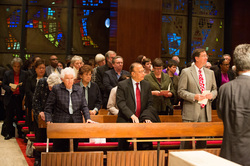|
by Molly Butler  50th Anniversary of the CCUN 50th Anniversary of the CCUN Molly is a second-year Loretto Volunteer living in New York City. She serves as the assistant NGO representative at Loretto at the UN, Loretto's presence at the United Nations. The Church Center for the United Nations (CCUN) celebrated its 50th anniversary this October, an occasion that symbolized the unwavering presence of civil society peacemakers right outside the front door of the UN headquarters. Since its inception in the early 1960s, the building has been a safe haven for grassroots organizations working for justice at the global level and advocating with marginalized groups for an inclusive inter-governmental process. It has drawn a diverse set of civil society groups over the years (both religious and secular), all of which work for human rights and peace. On October 9th, folks from around the world gathered in the CCUN chapel to honor the foundations upon which this building stands -- from its construction across the Midtown East River to the original women visionaries and the countless civil society organizations sustaining its peaceful mission all these years. For someone whose work at the CCUN was just beginning at the time of the jubilee, this collective reflection on the last 50 years came at a formative time. It contextualized Loretto’s 20 years at the UN and grounded my understanding of how the community’s values landed us in this particular space – an intentional space. I was moved by the stories told by ambassadors, activists, clergy and other members of civil society whose tributes to the building reflected the far-reaching impact of the CCUN within the greater community. I learned that at the time the center was built it was the only New York City building where management supported equal pay and gender equity for women and men of its custodial staff, a symbol of the social justice pillar that upholds the 13-story building today. The CCUN’s continuous hospitality has opened a safe space for all faiths and perspectives, one that encourages collaboration among civil society groups.
After 5 months of working with Loretto at the UN, I consider this coalitional work to be at the heart of what we do here. Loretto serves on a number of different committees including the Mining Working Group, The Working Group on Girls, Financing for Development, Disarmament and Social Development. When I first started attending these meetings I was struck by the overwhelming number of faith-based organizations active in these coalitions, sparking a personal interest in what it means to be a “faith-based” NGO at the UN. I wondered if there was something inherent to this spiritual component, which is difficult to decipher given the overlapping goals and solidarity among all different groups working at the CCUN, both religious and secular alike. This question is one that clearly has no definitive or single answer and is one that I will continue to explore for myself throughout the year. When I talk with other NGO representatives about their spiritual relationship to this work, it is similar to that of Loretto, an inseparable commitment to faith and service. What I do know is that for me there is something both comforting and sacred about walking into work each morning knowing that the chapel stands at the foundation from where Loretto’s office sits 6 floors up. This same space where we all gathered for the CCUN commemoration is one where I have experienced inner-peace and a connection to the greater purpose of justice work surrounding me, and that precedes me. I know that I take more inspiration from the vision upon which the CCUN was founded 50 years ago – to bring together groups of all faiths, backgrounds, geographies working for peace – than in searching for a distinct connection among religious. The Church Center is an intentional community that makes room for these questions.
1 Comment
|
In Their Own WordsWe invite you to get to know Loretto Volunteers and the program here. Volunteers introduce themselves and reflect on their experiences. |

